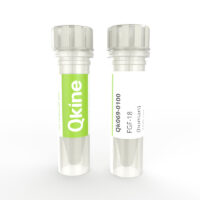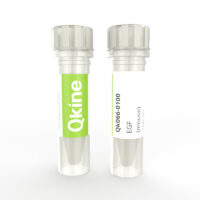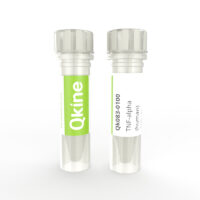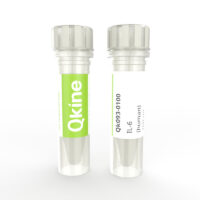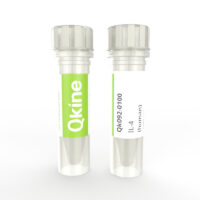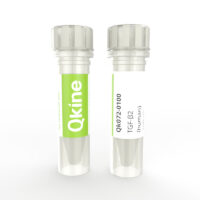- Fibroblast Growth Factor 18 (FGF-18), a member of the FGF family, characterized by its heparin-binding properties plays a significant role in regulating diverse biological processes such as embryonic development, skeletal and bone development, cartilage maintenance, angiogenesis and tissue repair.In cell culture, FGF18 is widely used to support cell culture maintenance and proliferation, promote chondrogenic and osteogenic differentiation of stem cells, stimulate angiogenesis, and enhance tissue regeneration.FGF-18 is a high purity truncated protein with a molecular weight of 20.2 kDa. This protein is carrier-free and tag-free to ensure its purity with exceptional lot-to-lot consistency. Qkine Fibroblast Growth Factor 18 is suitable for the culture of reproducible and high-quality stem cells, primary cells and other relevant cells.
- Epidermal growth factor (EGF), a member of the EGF family of proteins, plays a significant role in regulating cellular processes such as cell growth, proliferation, differentiation, development, and tissue homeostasis. It is an essential growth factor in many stem cells and organoid culture media.In cell culture, mouse EGF is crucial for stem cell maintenance, proliferation, differentiation, organoid culture growth and survival. It is also widely used for disease modelling, drug screening, tissue engineering, and regenerative medicine. Overall, EGF is a key player in cellular regulation and functions.Mouse EGF is a high purity protein with a molecular weight of 6.1 kDA. This protein is carrier-free and tag-free to ensure its purity with exceptional lot-to-lot consistency. Qkine mouse EGF is suitable for the culture of reproducible and high-quality stem cells and various tissue-specific organoids.
- Tumor necrosis factor-alpha (TNF-α) is a cytokine involved in cell signaling, primarily produced by immune cells like macrophages. It plays a central role in inflammation, immunity, and regulating cell survival and death. TNF-α binds to its receptors, TNF receptor 1 and TNF receptor 2, triggering pro-inflammatory responses, apoptosis, and immune cell activation.Human TNF-α has a molecular weight of 17.3 kDa. This protein is carrier-free and protein tag-free to ensure its purity with exceptional lot-to-lot consistency. Qk083 TNF-alpha is suitable for the culture of reproducible and high-quality hematopoietic stem cells and other relevant cells.
- Interleukin-6 (IL-6) is a multifunctional cytokine that regulates immune responses and inflammation. It is produced by various cells, including immune cells such as T cells and macrophages, as well as non-immune cells like fibroblasts and endothelial cells. IL-6 plays a critical role in infection defense and tissue damage by promoting inflammation and activating immune cells. IL-6 is involved in various physiological processes, including the regulation of metabolism, tissue repair, and hematopoiesis. Human IL-6 has a molecular weight of 20.9 kDa. This protein is carrier-free and tag-free to ensure its purity with exceptional lot-to-lot consistency. Interleukin-6 is suitable for the culture of reproducible and high-quality hematopoietic stem cells and other relevant cells.
- Interleukin-4 (IL-4) is a pleiotropic, immune-modulatory cytokine that is secreted primarily by mast cells, T-cells, eosinophils, and basophils. IL-4 plays a crucial role in hematopoiesis, the regulation of antibody production, the stimulation of activated B cell and T cell proliferation, and the differentiation of B cells into plasma cellsIL-4 induces the expression of class II MHC molecules on resting B-cells and aids regulation of the low-affinity Fc receptor for IgE (CD23) expression on lymphocytes and monocytes. IL-4 additionally is a key regulator in adaptive immunity.Human IL-4 has a molecular weight of 15.1 kDa. This protein is carrier-free and tag-free to ensure its purity with exceptional lot-to-lot consistency. Qk092 is suitable for the culture of reproducible and high-quality stem cells and other relevant cells.
- Transforming Growth Factor beta 2 (TGF-β2), part of the TGF-β superfamily, regulates a wide array of cellular processes, including proliferation, differentiation, wound healing, apoptosis, metabolism, embryogenesis, and tissue repair. It is an essential growth factor in many embryonic and induced pluripotent stem cell culture media.In cell culture, TGF-beta 2 is crucial for directing cell fate, especially in stem cells and differentiation and facilitating wound healing processes. As a modulator of immune responses and a factor in tumour development, TGF-β2's involvement extends to immunomodulation and interaction within the tumour microenvironment. Its other applications in cell culture include stimulating protein expression and secretion. Overall, TGF-beta 2 emerges as a key player in cellular regulation with diverse biological functions.TGF-beta 2 is a high purity protein with a molecular weight of 25.4 kDa. This protein is carrier-free and tag-free to ensure its purity with exceptional lot-to-lot consistency. Qkine TGF-beta 2 is suitable for the culture of reproducible and high-quality stem cells and other relevant cells.
